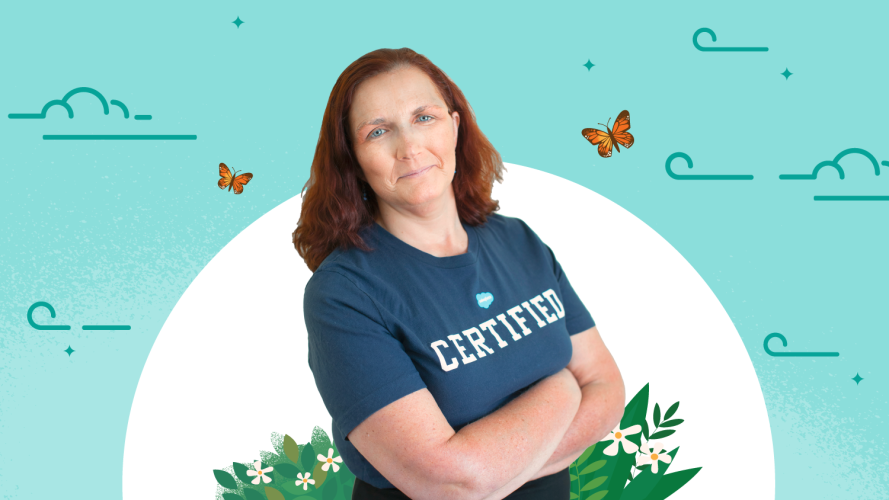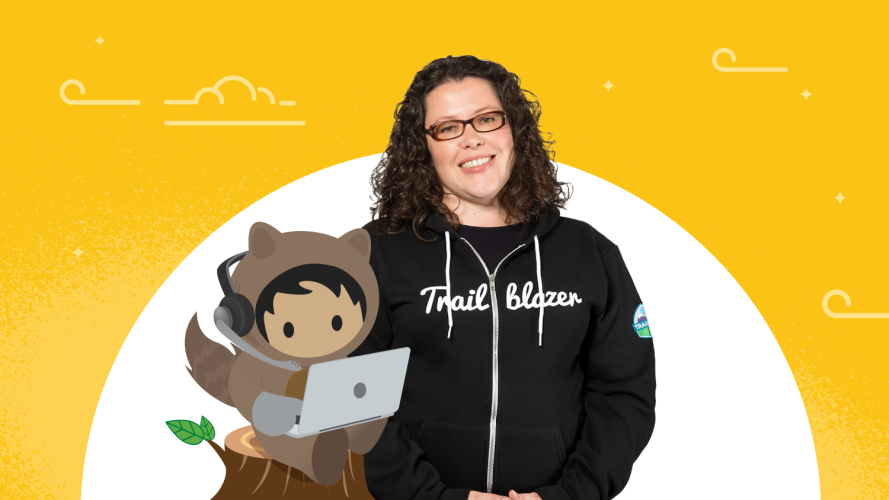3 Steps We Take to Safeguard Your Salesforce Credentials



Safeguarding the value and security of your hard-earned Salesforce Credentials is important. Whether you’re a new or experienced Trailblazer, know that we are working every day to make sure all your hard work is protected.

Amy Regan Morehouse
The Salesforce ecosystem has 50+ credentials available — including certifications and superbadges — and safeguarding their integrity is important. Here’s how you can work with us to keep your Salesforce Credentials safe.
Keeping your Salesforce credentials secure is our top priority
The team at Trailhead — Salesforce’s free online learning platform — is committed to protecting the value of the Salesforce credentials you display on your Trailblazer.me profile. Earning those certifications wasn’t easy, and you’re justifiably proud of them.
So it’s our job to make sure those credentials really reflect all the hard work and study time you put in to earn them. Here are three key steps we take every day to make sure that Salesforce credentials are secure.
Earn role-based Salesforce credentials
Prove your hands-on experience with Salesforce and get a competitive edge that leads to new opportunities.
Step 1. Defense – We designed a strong system
Our system is under constant review and evaluation. Whether we’re scanning for changes in test-taking behavior or updating exams themselves, we keep credentials safe by:
- Keeping exams up to date: Exams are continuously updated throughout the year, which keeps them current and in alignment with Salesforce release cycles. Users also give us great insight and feedback, and we use that to update the exams as well.
- Making exam questions and answers random: Each exam is purposely designed to be a unique experience for the test-taker. We randomize questions, answers, and the order in which they’re asked.
- Keeping track of unusual exam statistics: We keep an eye on our average exam scores, the pass/fail trends, and other statistics that might indicate a compromised exam. We can quickly detect any potential problems and make decisions about whether an exam needs to be updated or changed, even outside the regular release cycle.
- Limiting exam retakes: We know that not everyone will pass their exam on the first try, and that’s OK! But as a security measure, we limit the number of times one user can retake the same exam during any one release cycle. This prevents anyone from simply memorizing all the questions and answers until they get it right. Learn more about our exam retake policy here.
Step 2. Identification – We monitor for security issues
We know that it’s important to quickly identify potential credential security violations, so we’re always looking out for any behavior that may compromise certification exam content or superbadge solutions.
We want to ensure that every Trailblazer has an equal opportunity to prepare for earning a certification or superbadge.
- Violation Reporting: Think you’ve seen a Credential Security violation? Submit a case for our team to look into.
- Continuous internet monitoring: We are always scanning the internet for any person or company that requests, or offers to share or sell, Salesforce Certification exam content or superbadge solutions.
- Strong proctoring protocols: Both in-person and online exams are closely monitored by proctors, who are trained to identify potential cheating behaviors during a certification exam.
Step 3. Correction – We act quickly to address any problems
We take various corrective actions against anyone who violates security protocols, depending on the situation:
- Removal of compromising posts: When posts are shared in the Trailblazer Community or Partner Community that could compromise the security of a certification exam or superbadge, we follow up and send a warning notice to the post author. Any post that is in violation of credential security policies is deleted.
- Official takedown notices: Some compromising content is shared on platforms we do not control, and for that type of content, we’ll send takedown notices to both the hosting site and content author, with an explanation of how the content violates our credential security and the consequences for not immediately removing it.
- Updating any compromised exam content: Compromised certification exam questions and superbadge content will be replaced.
- Permanent actions for offenders: Depending on how severe the violation is, we can take actions including revoking any credentials awarded, and permanently banning violators from the program.
What to do (and not to do)
When you participate in our credentials program, you’re asked to agree to the terms of the Salesforce Certification Program Agreement and Code of Conduct. Those terms are the baseline, and we also encourage you to:
- Use Trailhead —the only official resource— when you’re preparing for certification exams or superbadges. We’ve designed a great library of content to get you ready for your exam, including trails, trailmixes, exam guides, Knowledge Articles, practice exams, and Trailhead LIVE.
- Use the Developer Org and Trailhead Playground to practice scenarios.
- Join an existing study group in the Trailblazer Community, or form your own!
- Find a mentor in the Trailblazer Community.
- Once you’ve gotten the results of your certification exam, carefully read the section-level feedback for a better understanding of your unique strengths and any potential areas of improvement.
We ask you not to:
- Share, use, or request exam dumps. Not only can these contain inaccurate and outdated information, but users having access to exam material before they take an exam devalues the certification for everyone.
- Share any information from the exam you took, including superbadge solutions or any questions.
- Use any devices or get any outside help during your exam — review the guidelines for more information on procedures for both online and in-person exams.
All reported security violations are taken very seriously and reviewed on a case-by-case basis.
There are potential long-term consequences for any Program Agreement violations, including suspension from online proctored exams, suspension from all certification exams, revocation of certifications, and being removed from the Salesforce Credentials program and the Trailblazer Community entirely.
Help us protect credential security
We do everything we can to design a secure system, quickly identify any potential problems and immediately correct any security issues we find, but keeping the system safeguarded requires your help, too.
We have a system set up to take reports of any suspicious activity — whether it’s a post in the Trailblazer Community asking for an exam dump or a video posted with superbadge solutions.
So if you see anything suspicious you can take action.
- Open a Credential Protection case: Here’s the link to submit a case. We will check into it and take action right away if a security violation is confirmed.
- Let us know about violations in social/community groups: Hit the “flag as spam” notification button to alert us to the suspicious post, or report it to the group moderator.
- Promote our security protocols: Support our security efforts by sharing the Salesforce Certification Program Agreement and Policies as well as the Credential Protection case form, that way you can help us make sure other Trailblazers know the protocols.
Thank you for your help
Hopefully, now you have a better understanding of the system we’ve set up to help safeguard the valuable credentials you’ve worked so hard to earn. Thank you for helping us identify and correct any potential security violations.























